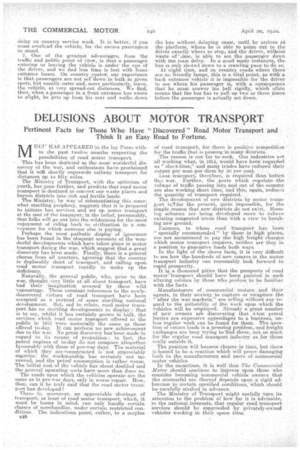DELUSIONS ABOUT MOTOR TRANSPQRT
Page 20

If you've noticed an error in this article please click here to report it so we can fix it.
Pertinent Facts for Those Who Have " Discovered " Road Motor Transport and Think It an Easy• Road to Fortune.
UCY HAS APPEARED in the lay Press within the past twelve months respecting the possibilities of road motor transport.
This has been depicted as the most. wonderful discovery of the war, and enthusiasts havesproclaimed that it will shortly supersede railway transport for distances up to fifty miles.
The Ministry of Transport, with the optimism of youth, has gone further, and predicts that road motor transport is destined to convert our waste places and barren districts into rich and fertile lands. The Ministry, by way of substantiating this somewhat startling prophecy, suggests that it. is prepared to initiate bus services and set up motor transport at the cost of the. taxpayer, in the. belief, presumably, that folks will go out into the wilderness for the mere enjoyment of riding back to civilization in a conveyance for which someone else is paying. Perhaps the most pathetic display of ignorance has been found in the eloquent accounts of the wonderful developments which have taken place in motor transport during the war, which suggest that a. great discovery has been made.. Finally, there is a. general chorus from all quarters, agreeing that the country is deplorably short of transport., and calling upon road motor transport rapidly to. make up the deficiency.
Naturally, the general public, who, prior to the war, thought. very little at all about transport., have had their imagination aroused by these wild va,pomings. These constant references to the newlydiscovered virtues of road transport have been accepted as a portend of some startling .national development. But, sad to relate, road motor transport has no startling developments to display ; that is to say, whilst it has certainly grown in bulk, the services which road motor transport offered to the public in 1913 were materially the same as those offered to-day. It can perform no new achievement due to the war. No great discovery has-been made in regard to its means of propulsion in fact, the petrol engines of to-day do not, compare altogether favourably with those of pre-war days. The material of which they are 'constructed is not appreciably superior; the workmanship has certainly not improved, and.the petrol consumption is rather worse, The initial cost of the vehicle has about doubled and the general operating costs have more -than done so.
The roads upon which the vehicles operate are the same as in pre-war days, only in worse repair. How, then, can it be truly said that the road motor trans-, port has developed ? • There is, moreover, no appreciable shortage of transport, • at least of road motor transport, which, it must be borne in mind, can only handle certain classes of merchandise, under certain restricted conditions. The indications point, rather, to a surplus 048 of road transport, for there is positive competition for the traffic that is passing in many districts. The reason is not far to seek. Our industries are all working what, in 1914, would have been regarded as " shost-timee' and many trades have reduced their output per man per diem by 50 per cent. Lose transport, therefore, is required than before the war. Further, the ports which regulate the volume of traffic passing into and out of the country are also working short time, and this, again, reduces the quantity of transport required. The development of new districts by motor transport is',Ifor the present, quite impossible, for the simple reason that new districts do not exist. Housing schemes are being developed more to relieve existing congested areas than with a view to breaking new ground..
Farmers, to whom road transport has been "specially. reeommended " by those in high places, are not accustomed to pay the high freight charges which motor transport requires, neither are they in a position to guarantee loads both ways. In the light of the above facts, it is very' difficult to see how the hundreds. of new comers in the motor transport industry can reasonably look forward to rapid prosperity. It •ia a thousand pities that the prospects of road motOrIransport should have been painted in such alluring colours by those who profess to be familiar with the facts.
Manufacturers of commercial motors and their agents, in their anxiety to capture or recapture the "'after the war markets," are selling without any regard to the suitability of the work upon which the vehicles will be employed. Already a great number of new owners are discovering that. 4-ton petrol lorries are expensive appendages to a business, unless regular work can be found for them. The question of return loads is a, pressing problem, and freight exchanges are busy trying to 'find these, not so much for the regular road transport industry as for those really outside it.
The position will become clearer in time, but there is bound to be a reaction which will prove damaging both to the manufacturers and users of commercial motor vehicles.
In the meantime, it is well that The Commereid Motor ,should continue to impress upon those who consider becoming commercial vehicle oweers that the successful use thereof depends upon a rigid adherence to certain specified conditions, which should be carefully studied in advance.
The Ministry of Transport might usefully turn its attention to the problem of how far it is advisable, in the national interests, that regular road transport Service.s should be. superseded by privately-owned vehicles working in their spare time.




























